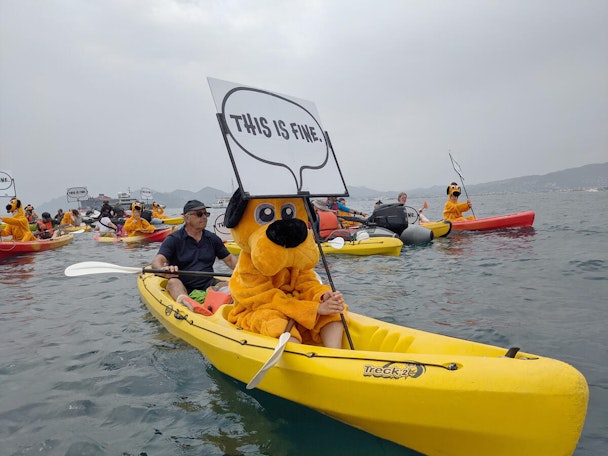Will anything change in adland after Greenpeace’s Cannes Lions protests?
Adland’s complicated relationship with fossil fuel companies took center stage at Cannes Lions last week, and it got the industry talking about the role it plays in tackling the climate crisis. Here, The Drum explores the ramifications of climate activism in Cannes – is this a watershed moment for the industry? Or will things return to business-as-usual now the rosé bottles have (hopefully) been recycled?

Greenpeace protestors were the talk of Cannes as they donned dog costumes / Image via Greenpeace
Last week saw the return of adland’s biggest get-together, Cannes Lions, after a two-year hiatus during the Covid-19 pandemic. However, if the industry thought it would be celebrations all around, it was sorely mistaken. Back in 2019, it was Extinction Rebellion that gained notoriety for its protests at the festival. This year it was Greenpeace that took center stage to speak out against greenwashing – particularly by the oil and gas industry – and advertising’s role in propping up its social license to operate.
The action began with ex-adman turned activist, Gustav Martner, interrupting the opening ceremony to hand back the Lions award he had won for his work with Volkswagen. It continued throughout the week as Greenpeace campaigners stormed WPP’s beach takeover and scaled the Palais (a central location in the city) to protest adland’s failure to sever ties with big oil.
Reflecting on the events of the festival, Silvia Pastorelli, a policy advisor in climate change and energy at Greenpeace, says: “We know that conversations are happening now within agencies and the industry at large about ending oil and gas greenwashing and dropping fossil fuel clients. Loads of agencies, like the ones taking part in the Clean Creatives project, have already done it, and we are hoping that there will be more announcements to come.”
But some, including WPP, have reiterated their commitment to keep working with clients such as BP and Shell. Chief executive Mark Read said that despite criticism, the holding company would not end its relationships with its fossil fuel clients, as “there’s no one solution” to the climate change crisis. “Yes, energy companies are selling oil. But as consumers, we’re all driving cars and flying places. It requires a collective solution. Our industry should play a role in doing that ... there’s a role for what we do and a role for campaign organizations.”
Pastorelli says in response that agencies should “see that that level of complicity can also damage their reputation.”
“Marketing the ‘green side’ of firms like BP and Shell is just a smokescreen to hide their true colors: more expansion plans, more emissions and more displaced communities around the world,” she continues.
Greenpeace’s activity garnered enough attention to warrant an official response from WPP, but it’s unlikely to be the last time Read – and his fellow holding company chief execs – will have to address it.
Jonathan Wise, co-founder of the environmental advertising network Purpose Disruptors, warns that “it is clear that the pressure on WPP to drop fossil fuel companies will only increase from the activists on the outside, and more importantly from employees on the inside.”
‘Mounting pressure’
However, Greenpeace’s objection to the advertising industry continuing to work with fossil fuel clients does not merely end at the agency, or even holding company level. It is calling for an EU-wide ban on fossil fuel advertising and sponsorship, as well as advertising from the industries that rely on them such as automotive and aviation.
In the aftermath of Cannes, thousands more have signed the Greenpeace-backed EU Citizens’ Initiative petition to bring the ban into law, according to Pastorelli.
Solitaire Townsend, co-founder of agency Futerra, suggests that these sorts of protests by organizations such as Greenpeace are, for now, more likely to have a greater impact outside agency walls – ushering in pressure to change from “regulators, consumers, the media and activists.”
Inside the industry, “it is difficult to get a man to understand something when his salary depends upon his not understanding it,” she tells The Drum.
Townsend’s predictions are grounded in the simple fact that widescale regulation against climate misinformation and greenwashing is becoming increasingly commonplace. Last week (June 30) the Financial Conduct Authority (FCA) announced its plans to crack down on capital-raising firms, such as banks, making misleading claims about their climate impact. It will also go after the advertising agencies that help them.
Meanwhile, ad bans on corporate greenwashing are also becoming more and more frequent, and in some cases greenwashing is being dealt with at the highest levels of the law. In the US, entire states and cities, backed by environmental organizations, are taking oil giants to court for climate misinformation.
As a result, agencies will be accountable to their shareholders sooner than they think.
“We are going to start seeing a lot more investor activism and agency backers questioning whether you have an adequate audit and risk committee, and what you are going to do if you are taken to court over greenwashing claims,” adds Townsend.
Going forward, agencies will likely need to think more seriously about the climate campaigns they do agree to work on, so as to also avoid unintended greenwashing. A recent Chartered Institute of Marketing study shows 40% of marketers report that they lack relevant sustainability marketing qualifications, despite 76% of them having been involved in sustainability projects over the past five years.
Jacob Simon is a member of the aforementioned Clean Creatives project, a coalition of advertising workers who oppose the industry’s work with fossil fuel clients and greenwashing. He says that during his time protesting at Cannes, conversations with the industry seemed to suggest that workers are engaged with adland’s role in addressing the climate crisis.
“As we stood in the hot sun with sweat dripping all around us, it was undeniable that climate change was impacting us all at that moment. The conversations I had reflected the urgency and passion to find solutions, but with a lack of knowledge on the vast power creatives have to decline fossil fuel clients and be more purposeful with the ads they make,” he tells The Drum.
Fellow Clean Creative and environmental activist Tolmeia Gregory, who notably confronted Shell’s chief executive to ask why the oil giant continues to conceal its impact on women, says the issue is that many workers at the mid-level and even lower senior levels do not feel empowered to speak up on environmental issues.
“People tell us they have no authority to speak up at their company, and I think that’s where we need to start,” she explains.
Purpose Disruptors’ Wise agrees, saying that the issue faced by WPP, and other agencies like it, is that they increasingly have too many employees on the side of Greenpeace who “are not willing to toe the line.” “Advertising people are kind, thoughtful and care about the future for their children, nieces and nephews. Many employees we speak to are fully awake to our climate emergency and understand change needs to happen, and one of those changes they share with us is that they believe their agency should no longer work on fossil fuel companies,” he says. Indeed, a recent survey by Comms Declare revealed that environmental impact is a major concern for young creatives entering the industry. Of 103 responses from under 30s in the PR industry, the survey found 73% are resistant to working with fossil fuel clients.
Wise says it would be “fascinating” to see what would happen if agencies like WPP were to poll their clients on whether they should continue relations with fossil fuel clients.
“What would happen if the majority said ‘no’? What happens then? This offers a different opportunity for leadership. Not to attempt to control from above, but to invite employees into the challenge.”
As the sun sets on Cannes Lions for another year, there is no denying that the industry at large is running out of places to hide when it comes to confronting its complicity in fabricating climate misinformation and propping up the industries most responsible for the crisis.
While internal initiatives such as the global rollout of Ad Net Zero and the UN-backed ‘Race to Zero’ campaign are committing to tackling internal emissions, as well as advertised emissions (emissions that result from the uplift in sales generated by advertising), and minimizing greenwashing, the question of boycotts against the most polluting clients remains a topic of contention.
Environmental organizations, including Greenpeace, warn that regardless of moral imperative, legislation is coming – and agencies would do well to prepare themselves against the rising tide.
